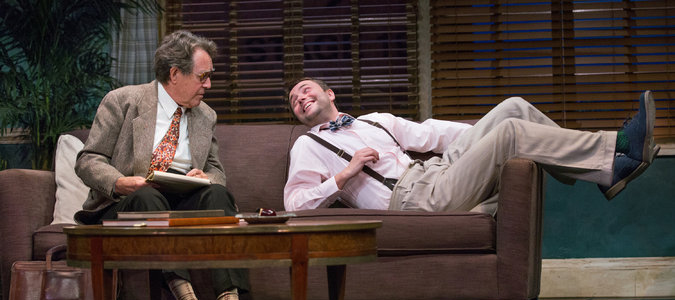

Billy & Ray
Opening Night: October 19, 2014
Closing: November 9, 2014
Theater: Vineyard Theatre
Billy & Ray, a whip-smart comedy charting the birth of the film noir genre, follows literary odd couple writer-director Billy Wilder (Vincent Kartheiser of “Mad Men”) and novelist Raymond Chandler (Broadway’s Larry Pine of CASA VALENTINA) as they contentiously collaborate to adapt Double Indemnity for the silver screen. Set in 1940s Hollywood, BILLY & RAY is the true story of how two brilliant and thorny artists battled the Hollywood censors and each other to create a groundbreaking movie classic. Directed by legendary director/writer/producer Garry Marshall (Pretty Woman, Beaches).
BUY TICKETSREAD THE REVIEWS:
October 20, 2014
When Billy Wilder directed Double Indemnity in 1944, he coined a new idiom: film noir, a style characterized by expressionistic lighting, dark shadows, and disillusioned, morally ambiguous characters. One would think this landmark occurrence would provide the basis for an eye-popping theatrical experience, but in the hands of playwright Mike Bencivenga, only the surface elements are explored. Billy & Ray is the name of Bencivenga’s comedy drama, which comes to the Vineyard Theatre after a run at the Falcon Theatre in Burbank, California. The Billy is obvious; the Ray refers to Raymond Chandler, the detective-fiction novelist hired to help turn James M. Cain’s pulpy novel of love, lies, and murder into the screenplay that would get around Hollywood’s decency codes. Chandler (played here by Larry Pine) had very few demands. All he asked for was a thousand dollars up front and sole authorship. When he returned with a script deemed impossible to shoot by Wilder (Vincent Kartheiser, of Mad Men), they were forced to collaborate together against Chandler’s wishes.
READ THE REVIEWOctober 20, 2014
For a textbook example of how to botch a great subject, see Billy & Ray. It’s not that the show’s terrible. Rather it’s dull. Dishwater dull. Stare-into-space-while-the-clock-ticks dull. All this for a play inspired by the making of Double Indemnity — film noir at its slinkiest, wittiest and most sophisticated. Vincent Kartheiser, struggling to free himself from his devious Pete Campbell persona on Mad Men, looks completely lost as Billy Wilder, the Austrian-born director whose accent Kartheiser botches badly. It’s 1943, and Wilder and producer Joe Sistrom (Drew Gehling) want to adapt James M. Cain’s crime novel into a flick.
READ THE REVIEWOctober 20, 2014
He created Happy Days and helmed hit movies such as Pretty Woman. But heavyweight director Garry Marshall’s soggy staging of the play, Billy & Ray, about the creative process, isn’t pretty — and offers few reasons to be happy. Mike Bencivenga’s fact-based tale unfolds in 1940s Hollywood, where director Billy Wilder (Vincent Kartheiser, of Mad Men), and hard-boiled author Raymond Chandler (Larry Pine) contentiously co-write the screenplay for Double Indemnity, a film noir game-changer. Thanks to a ham-fisted and cliche-packed script that saps authenticity, and clunky staging that works hard for corny laughs, “Billy & Ray feels like a triple eternity. The lead actors have done better work elsewhere. Drew Gehling plays producer Joe Sistrom. Sophie von Haselberg — a dead ringer for her mom, Bette Midler — is perky and efficient in the thankless role of Wilder’s Girl Friday.
READ THE REVIEWOctober 20, 2014
In a Paramount Pictures office in 1943, the soon-to-be-legendary filmmaker Billy Wilder (Kartheiser) works out the script for his latest project, Double Indemnity, with crime writer Raymond Chandler (Pine). Chatty and childish, Wilder is a pill, and Chandler has trouble swallowing him without regular swigs of bourbon he has hidden in his briefcase. You can’t blame him; bourbon should be under every seat at the Vineyard for Mike Bencivenga’s inept backlot comedy, Billy & Ray, which blends the excitement of scene-by-scene DVD commentary with the sophistication of junior-class high-school drama.
READ THE REVIEWOctober 20, 2014
Any given five minutes of the classic film noir Double Indemnity — I am tempted to say any single frame of the classic film noir Double Indemnity — packs more heat than the torpid two hours of Billy & Ray, a play by Mike Bencivenga about the combative collaboration between Billy Wilder and Raymond Chandler on the movie’s screenplay. Mr. Bencivenga’s slumberous drama, which opened at the Vineyard Theater on Monday night in a stolid production directed by the television veteran Garry Marshall, mostly takes place in the tony Paramount offices of Wilder, played by the Mad Men star Vincent Kartheiser. By this point, Wilder was an established writer-director who had just had a professional breakup with his favored screenwriting partner, Charles Brackett. (Noises suggesting their tumultuous parting are heard before the lights go up on Charlie Corcoran’s sleek set. The reason for their divorce has something to do with Wilder’s itch to film a certain pitch-black James M. Cain novel, which Brackett considered insufficiently uplifting. This is bad news for the producer Joe Sistrom (Drew Gehling), who paid a pile of Paramount’s money to option the book. But the pugnacious Wilder refuses to give in. “It’s time the movies grew up,” he scoffs. Scorning the stable of writers at the studio, he insists on finding the right guy for the material.
READ THE REVIEW





















